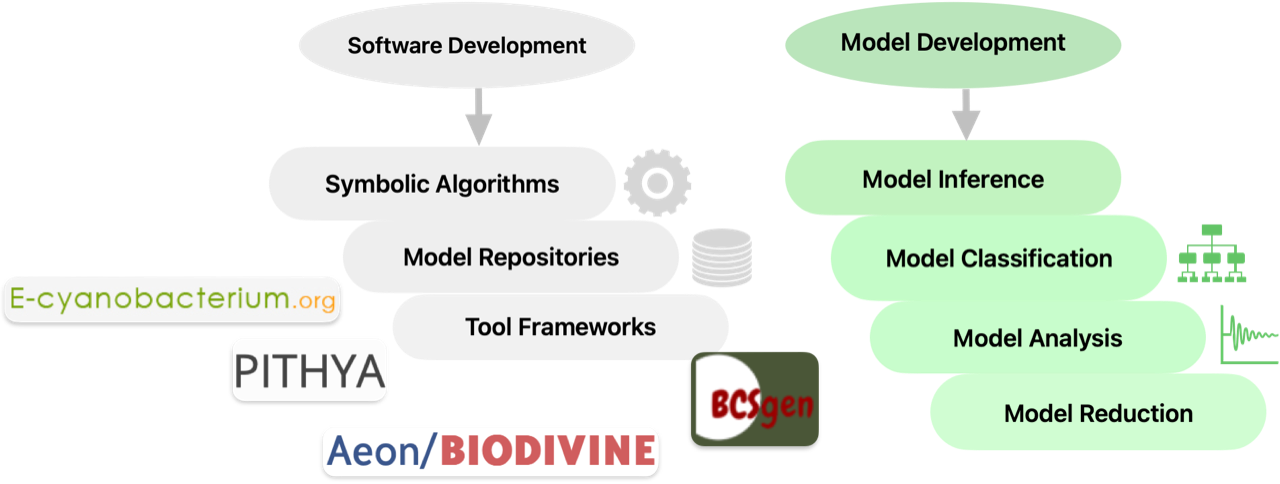The Czech SynBio Node initiative brings together research laboratories, companies, and other interested partners in the Czech Republic who view engineering biology and related fields (such as protein engineering, metabolic engineering, and systems biology) as key to understanding the functioning of organisms and living systems. They also recognize the vast potential of synthetic biology and modern biotechnologies to advance human society toward a knowledge-based bioeconomy and sustainable living.
What is synthetic biology?
Synthetic Biology (SynBio) is a multidisciplinary field that applies engineering principles to biology to study the fundamentals of life more efficiently. The knowledge gained is also used to develop new biotechnologies for the benefit of society.
For more information on synthetic biology, we recommend the following resources:
- Realizing the potential of synthetic biology to help people and the planet.
- Synthetic biology 2020–2030: six commercially-available products that are changing our world
- The second decade of synthetic biology: 2010–2020
- Building the SynBio community in the Czech Republic from the bottom up: You get what you give
News
Who we are
Individual members of the Czech SynBio Node initiative are listed below in alphabetical order under the headings of their respective research areas.
Metabolic Engineering

Microbial Bioengineering Laboratory
The team of the Microbial Bioengineering Laboratory (MBL), headed by Pavel Dvořák, develops microorganisms and their metabolic and regulatory pathways for biotechnology and trains new generations of microbiologists/bioengineers at the Faculty of Science of Masaryk University.
Dvořák P, Burýšková B, Popelářová B, Ebert BE, Botka T, Bujdoš D, Sánchez-Pascuala A, Schöttler H, Hayen H, de Lorenzo V, Blank LM, Benešík M. Synthetically-primed adaptation of Pseudomonas putida to a non-native substrate D-xylose. Nature Communications 2024,15(1):2666. Link
Bujdoš D, Popelářová B, Volke DC, Nikel P, Sonnenschein N, Dvořák P. Engineering of Pseudomonas putida for accelerated co-utilization of glucose and cellobiose yields aerobic overproduction of pyruvate explained by an upgraded metabolic model. Metabolic Engineering 2023, 75:29-46. Link
Dvořák P, Bayer EA, de Lorenzo V. Surface display of designer protein scaffolds on genome-reduced strains of Pseudomonas putida. ACS Synthetic Biology 2020, 9(10):2749–64. Link
Plant Synthetic Biology
Říha Laboratory, Boisivon Laboratory, Hejátko Laboratory
In a collaborative effort, three laboratories at CEITEC Masaryk University, led by Karel Říha, Helene Robert Boisivon, and Jan Hejátko are developing strategies to improving crop yields by manipulating plant reproductive development.
Valuchova S, Mikulkova P, Pecinkova J, Klimova J, Krumnikl M, Bainar P, Heckmann S, Tomancak P, Riha K. (2020) Imaging plant germline differentiation within Arabidopsis flowers by light sheet microscopy. Elife. 11;9. pii: e52546. doi: 10.7554/eLife.52546.
Jedličková V, Štefková M, Sedláček M, Panzarová K, Robert HS. (2023) Hairy root transformation and regeneration in Arabidopsis thaliana and Brassica napus. J Vis Exp. 2023 Dec 22;(202). doi: 10.3791/66223
Yamoune, A., Zdarska, M., Depaepe, T., Rudolfova, A., Skalak, J., Berendzen, K.W., Mira-Rodado, V., Fitz, M., Pekarova, B., Nicolas Mala, K.L., Tarr, P., Spackova, E., Tomovicova, L., Parizkova, B., Franczyk, A., Kovacova, I., Dolgikh, V., Zemlyanskaya, E., Pernisova, M., Novak, O., Meyerowitz, E., Harter, K., Van Der Straeten, D., and Hejatko, J. (2024). Cytokinins regulate spatially-specific ethylene production to control root growth in Arabidopsis. Plant Commun, 101013. doi: 10.1016/j.xplc.2024.101013
Volkava D, Valuchova Bukovcakova S, Mikulkova P, Pecinkova J, Skalak J, Hejatko J, Riha K. (2024) Cytokinin acts as a systemic signal coordinating reproductive effort in Arabidopsis. bioRxiv https://doi.org/10.1101/2024.07.09.602718
Protein Engineering
Jiri Zahradnik Research Group
The Protein Engineering in Biomedicine Group, led by Jiří Zahradník, is part of the First Faculty of Medicine, Charles University in Prague and is based at the BIOCEV research center. The team focuses on the application of protein engineering to address a wide range of challenges in biomedicine. One of our main areas of interest is the use of in vitro evolutionary techniques to simulate pathogenesis and study the evolution of pathogens in general.
Tamura, T., Mizuma, K., Nasser, H., Deguchi, S, Padilla-Blanco M. (co-first author), + 25 authors, Tanaka, S., Zahradnik, J. (corresponding), Ikeda, T., Takayama, K., Matsuno, K., Fukuhara, T., Sato, K. (2024) Virological characteristics of the SARS-CoV-2 BA.2.86 variant, Cell Host Microbe 14;32(2):170-180.e12. DOI: 10.1016/j.chom.2024.01.001
Zahradnik, J., Marciano, S., Shemesh, M., Zoler, E., Harari, D., Chiaravalli, J., Meyer, B., Rudich, Y., Li, Ch., Marton, I., Dym, O., Elad, N., Lewis, M.G., Andersen, H., Gagne, M., Seder, R.A., Douek, D.C., Schreiber, G. (2021) SARS-CoV-2 variant prediction and antiviral drug design are enabled by RBD in vitro evolution. Nat. Microbiol. 6 (9), 1188-1198. DOI: 10.1038/s41564-021-00954-4
Zahradnik, J., Kolarova, L., Debabrata, D., Marciano, S., Charendoff, Ch., Subtil, A., Schreiber, G. (2021) A protein engineered, enhanced yeast display platform for rapid evolution of challenging targets. ACS Synthet. Biol. 10(12), 3445-3460. DOI: 10.1021/acssynbio.1c00395
Klara Hlouchova Research Group
The Group of Synthetic Biology is based at the Faculty of Science, Charles University, Prague, headed by Klara Hlouchova.
Our main interest is evolution of structured and function proteins from the vast sequence space, ranging from the prebiotic era to extant de novo protein emergence. We are curious about Life as a phenomenon, about its origins, limits and requirements, be it on Earth or elsewhere in the Universe.
Codispoti S, Yamaguchi T, Makarov M, Giacobelli VG, Mašek M, Kolář MH, Sanchez Rocha AC, Fujishima K, Zanchetta G, Hlouchová K. (2024) The interplay between peptides and RNA is critical for protoribosome compartmentalization and stability. Nucleic Acids Res. doi: 10.1093/nar/gkae823
Heames B, Buchel F, Aubel M, Tretyachenko V, Loginov D, Novak P, Lange A, Bornberg-Bauer E, Hlouchova K. (2023) Experimental characterization of de novo proteins and their unevolved random-sequence counterparts. Nature Ecology & Evolution DOI:10.1038/s41559-023-02010-2
Makarov M, Sanchez Rocha AC, Krystufek R, Cherepashuk I, Dzmitruk V, Charnavets T, Faustino AM, Lebl M, Fujishima K, Fried SD, Hlouchova K. (2023) Early selection of the amino acid alphabet was adaptively shaped by biophysical constraints of foldability. J Am Chem Soc. 145(9):5320-5329. DOI:10.1021/jacs.2c12987
Loschmidt Laboratories
The research teams of the Loschmidt Laboratories at Masaryk University lead by Dr. Martin Marek, Dr. Zbynek Prokop, Dr. David Bednar and Dr. Stanislav Mazurenko, focus on fundamental principles of enzymatic catalysis and the development of proteins for environmental, chemical and biomedical applications. Computational design and directed evolution techniques are used to produce unique proteins with desired properties for basic research as well as practical applications. New methodological concepts, mathematical models, software tools and microfluidic platforms are developed for the rational design of proteins and their use in living organisms.
Kunka A., Marques S.M., Havlasek M., Vasina M., Velatova N., Cengelova L., Kovar D., Damborsky J., Marek M., Bednar D., Prokop Z. Advancing enzyme’s stability and catalytic efficiency through synergy of force-field calculations, evolutionary analysis, and machine learning (2023) ACS Catalysis, 13 (19), pp. 12506 – 12518. DOI: 10.1021/acscatal.3c02575
Schenkmayerova A., Toul M., Pluskal D., Baatallah R., Gagnot G., Pinto G.P., Santana V.T., Stuchla M., Neugebauer P., Chaiyen P., Damborsky J., Bednar D., Janin Y.L., Prokop Z., Marek M. Catalytic mechanism for Renilla-type luciferases (2023) Nature Catalysis, 6 (1), pp. 23 – 38. DOI: 10.1038/s41929-022-00895-z
Hess D., Dockalova V., Kokkonen P., Bednar D., Damborsky J., deMello A., Prokop Z., Stavrakis S. Exploring mechanism of enzyme catalysis by on-chip transient kinetics coupled with global data analysis and molecular modelling (2021) Chem, 7 (4), pp. 1066 – 1079. DOI: 10.1016/j.chempr.2021.02.011
Tomas Pluskal Research Group
The Tomáš Pluskal Group, based at IOCB Prague, focuses on discovering novel chemical scaffolds and their biosynthetic pathways, primarily in plants. Our findings, such as the first archaeal terpene synthase, which reshaped our understanding of the evolution of specialized metabolism, and new piper alkaloids, expand the range of bioactive compounds available for applications in medicine, agriculture, and biotechnology.
Integrative analysis of multimodal mass spectrometry data in MZmine 3. Schmid, R., Heuckeroth, S., Korf, A., Smirnov, A., Myers, O., Dyrlund, T. S., ... & Pluskal, T. Nature Biotechnology, 2023 DOI: 10.1038/s41587-023-01690-2
Highly accurate discovery of terpene synthases powered by machine learning reveals functional terpene cyclization in Archaea. Samusevich, R., Hebra, T., Bushuiev, R., Bushuiev, A., Čalounová, T., Smrčková, H., ... & Pluskal, T. bioRxiv, 2024 DOI: 10.1101/2024.01.29.577750
Computational metabolomics reveals overlooked chemodiversity of alkaloid scaffolds in Piper fimbriulatum. Damiani, T., Smith, J., Hebra, T., Perkovic, M., Cicak, M., Kadlecova, A., ... & Pluskal, T. The Plant Journal, in press DOI: 10.1111/tpj.70086
Systems Biology
Bioinformatics and Systems Biology Lab
The team of the Bioinformatics and Systems Biology Lab (BioSys_BUT), headed by Karel Sedlář, aims at systems descriptions and holistic analyses of non-model bacteria uncovering their potential for white biotechnology. As an internal part of the Department of Biomedical Engineering at the Faculty of Electrical Engineering and Communication, Brno University of Technology, the lab is directly involved in the training of new generations of biomedical engineers and bioinformaticians.
Jureckova, K., Nykrynova, M., Slaninova, E., Fleuriot-Blitman, H., Amstutz, V., Hermankova, K., Bezdicek, M., Mrazova, K., Hrubanova, K., Zinn, M., Obruca, S., & Sedlar, K. (2024). Cultivation driven transcriptomic changes in the wild-type and mutant strains of Rhodospirillum rubrum. Computational and Structural Biotechnology Journal, 23, 2681-2694. DOI: https://doi.org/10.1016/j.csbj.2024.06.023
Musilova, J., Vafek, Z., Puniya, B. L., Zimmer, R., Helikar, T., & Sedlar, K. (2024). Augusta: From RNA‐Seq to gene regulatory networks and Boolean models. Computational and Structural Biotechnology Journal, 23, 783-790. DOI: https://doi.org/10.1016/j.csbj.2024.01.013
Hermankova, K., Kourilova, X., Buchtikova, I., Obruca, S., & Sedlar, K. (2024). Small RNA Analysis in Caldimonas thermodepolymerans Provides Insight into Non-Coding Regulatory Mechanisms. In 11th International Conference on Chemical Technology Book of Abstracts (p. 200).
Systems Biology Laboratory
Beneš N, Brim L, Huvar O, Pastva S, Šafránek D. Boolean network sketches: a unifying framework for logical model inference. Bioinformatics 39 (4), btad158. https://doi.org/10.1093/bioinformatics/btad158
Petrov T, Hajnal M, Klein J, Šafránek D, Nouvian M. Extracting individual characteristics from population data reveals a negative social effect during honeybee defence. PLoS Computational Biology 18 (9), e1010305. https://doi.org/10.1371/journal.pcbi.1010305
Beneš N, Brim L, Huvar O, Pastva S, Šafránek D, Šmijáková E. AEON. py: Python library for attractor analysis in asynchronous Boolean networks. Bioinformatics 38 (21), 4978-4980. https://doi.org/10.1093/bioinformatics/btac624




























